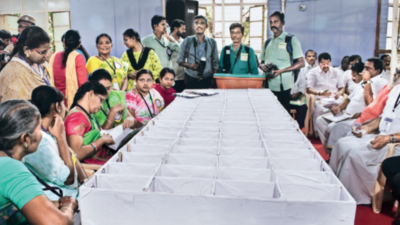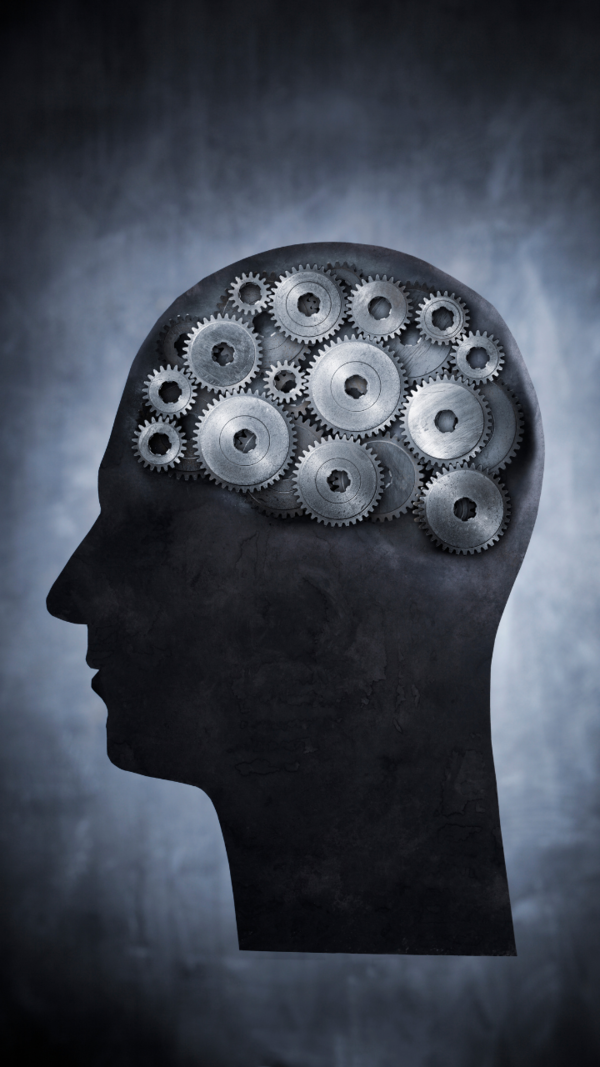- News
- City News
- erode News
- Why bypolls score high on voter turnouts and victory margins
Trending
This story is from March 3, 2023
Why bypolls score high on voter turnouts and victory margins
The victory of former Union minister and Congress candidate, E V K S Elangovan, a DMK ally, in the Erode East assembly constituency came as no surprise, given the trend in Tamil Nadu of the party in office winning bypolls.

Bypoll politics has been marked by cash-for-vote models
The show of strength by the DMK-led alliance as well as its opponents made it one of the most fiercely fought byelections. It also registered a high voter turnout and a big victory margin (more than 60,000 votes).

In 32 bypolls, the voter turnouts have been more than those in the preceding assembly election. Erode East this time recorded a 9% increase in voter turnout compared to the 2021 assembly election when the urban Kongu constituency registered 66% turnout. In 2016, the polling was 69%.
Election Commission of Inidia data shows bypolls record more voter turnouts than regular assembly elections. In Thirumangalam, for instance, the voter turnout spiked from just 78% in the 2006 general elections to 88% in the 2009 byelection. In Pennagaram, the turnout rose from 72% in the 2006 assembly election to 85% in the 2010 byelection.
In Radhakrishnan Nagar in Chennai, the turnout was 68% in the 2016 assembly election. But in the bypoll held the next year, more than 77% of voters turned up at polling booths.
Bypoll politics has been marked by cash-for-vote models. Aggressive campaigning by political parties and concentrated efforts by election authorities in creating awareness on voting also contribute to voter turnout. “Cash distributed to voters in the assembly elections is usually around `200 a person, while in bypolls it is anywhere between `2,000 and `3,000.
Also, partymen are more persuasive and persistent in rounding up voters. A dedicated team of partymen headed by senior functionaries repeatedly beckon voters to booths.
The AIADMK micro-manages the byelection work by appointing senior leaders for every two booths to “take care of the voters”, says a minister from the southern belt. It is no wonder that amidst the occasional boycott of elections by political parties, the DMK-Congress combine won all the 11 bypolls in 2006-11, and the AIADMK 18 out of the 32 byelections during its tenyear tenure from 2011 to 2021.
In 2009, five constituencies, including Srivaikuntam, Bargur, Cumbum, Thondamuthur, and Ilayangudi, went to the polls. They were necessitated by the death of Congress MLA D Selvaraj and resignation of AIADMK MLA M Thambidurai and DMK MLA Raja Kannappan to contest the Lok Sabha polls.
Two MDMK MLAs resigned owing to differences with the party high command. Amid boycott by the opposition AIADMK, MDMK and the PMK, the DMK-Congress combine retained Ilayangudi and also swept the rest with a victory margin in the range of 31,000 to 59,000 votes.
The seats were won by the AIADMK alliance in the preceding assembly election by a margin of about 1,600-2,700 votes (a smaller margin as Vijayakanth’s DMDK cut into the votes). It was a reversal of sorts post 2011, as the AIADMK scripted another record.
The J Jayalalithaa-led AIADMK comfortably defeated the DMDK by a margin of 71,000 votes in Pudukkottai, while the winning margin of the CPI in the preceding assembly election was 3,101 votes. The winning streak continued in Sankarankovil. In the following year, the AIADMK’s P Saroja won the Yercaud seat with a margin of 78,116 votes, which was far more than the votes secured by her spouse, C Perumal in 2011, whose death necessitated the bypoll.
The Srirangam segment stood solidly behind the AIADMK after Jayalalithaa lost the seat in the wake of her conviction in the disproportionate assets case. The winning margin of 96,500 votes of the AIADMK in the bypoll was double the margin secured by Jayalalithaa.
When she returned from Bengaluru prison, RK Nagar gifted her a thumping win with a margin of 1.5 lakh votes – the highest in Tamil Nadu’s bypoll history. Association for Democratic Reforms co-founder Jagdeep S Chhokar says the higher poll percentage could be attributed to greater focus of the parties on the bypoll unlike during general assembly elections when there are several constituencies to concentrate on.
“Giving gifts and money to voters in Tamil Nadu is known. In the northeast election, the Election Commission of India said the seizure of freebies has gone up 23 times since the previous election. Bribing voters happens across the country. It makes a mockery of democracy.
The ECI cannot do much and it cannot be the custodian of morals. Political parties are responsible for this,” says Chhokar. In a rare move, the ECI had cancelled elections to Aravakurichi and Thanjavur assembly seats in May 2016 after reports of large-scale distribution of cash and gifts to voters surfaced.
Then AIADMK candidate V Senthil Balaji retained the Aravakurichi seat in the election that took place in November 2016, and won the bypoll held in 2019 by a margin of more than 30,000 votes. He contested the bypoll on a DMK ticket. The famous Thirumangalam formula that made headlines for bribing voters by slipping cash in newspapers saw the DMK winning the bypoll in 2010 with a margin of about 39,000 votes, up from the MDMK’s 4,144 margin in the preceding poll.
Former chief election commissioner T S Krishnamurthy says there is no need for a byelection when the remaining term of the legislature is less than two-and-a-half years.
“Allow the party that had won to nominate someone for the rest of the term or give the post to the one who came second in the earlier election. It will substantially reduce violence and money power. I had given this suggestion in July 2004 in my letter to then Prime Minister Manmohan Singh,” said Krishnamurthy.
The bypolls are, however, crucial in certain cases. The 22 bypolls of 2019 were necessitated by the disqualification of 18 dissident AIADMK MLAs and that of Hosur AIADMK MLA due to conviction in an arson case. There were also seats left vacant by the deaths of DMK leader M Karunanidhi and MLAs of Thiruvarur and Thiruparankundram.
The AIADMK led by Edappadi K Palaniswami, then TN chief minister, won nine of these seats to complete its term. Given the local political dynamics, AMMK chief T T V Dhinakaran played spoilsport in seven seats, including Harur, Manamadurai, Ottapidaram, Periyakulam, Sattur, Sulur and Thiruparankundram. The polling percentage was more than 75% in 16 seats that had bypolls.
The opposition DMK won 13 seats and its highest winning margin was about 68,000 votes at Perambur in Chennai. After the general elections in 2019, the AIADMK was again on track, and wrested the Nanguneri and Vikravandi seats from the Congress and the DMK with a margin of about 33,000 votes and close to 45,000 votes respectively.
Not always had the party in power — or its allies — won bypolls. Dravidian historian K Thirunavukkarasu said the victories of DMK leader P U Shanmugam in the Tiruvannamalai assembly constituency during Kamaraj’s rule in 1963 and Maya Thevar of the AIADMK in Dindigul Lok Sabha seat in 1973 when the DMK was in office were defining moments in electoral battles in the state.
TNCC chief K S Alagiri says voters always stood firm in electing the party in office to encourage it to do good for the constituency. An impressive performance with the might of cash could, however, take the zing out of the victory.
End of Article
FOLLOW US ON SOCIAL MEDIA










